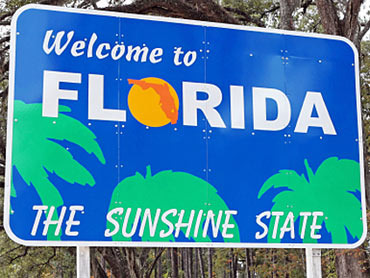Swing State Florida May Tilt Toward GOP Candidate

Perhaps the most controversial swing state of all, Florida is on track to once again be a political battleground for presidential candidates in the November election. First Lady Michelle Obama will speak at a grassroots campaign event in Miami, Florida today. And although President Obama won the state by 3 points in 2008, there are a number of contributing factors that may influence the state to favor Mitt Romney.
Since 2008, Florida has suffered effects of a "sour economy," after being hit by a "wave of home foreclosures". In the 2010 "Red Wave" midterm elections, Republicans won the governorship, the open seat Senate race and four Congressional seats. For these reasons, President Obama standing in the state makes it uncertain he will have the same success as he did in 2008.
The Sunshine state also has a growing number of conservative retirees that will most likely vote for the GOP candidate. On the other hand, the state continues to grow in numbers among non-Cuban Hispanics, a demographic with which Democrats and President Obama perform exceptionally well.
Florida’s recent population growth led to the creation of a new Congressional district for 2012, and 41% of the new district’s voting-age is Hispanic.
Although the Republican Party typically views non-Cuban Hispanics as receptive to GOP economic and social views, these voters hesitate to fully support the party due to the Republican stance on illegal immigration. Mitt Romney’s campaign aims to garnish Hispanic support in Florida by shifting the focus from immigration to the importance of the economy and subsequently, jobs.
Despite Florida’s mostly Republican lawmakers, Romney faces challenges to make “real inroads among Hispanic voters.” In 2008, Cuban-Americans in Southern Florida strongly supported John McCain, but President Obama won 57% of the Florida, Hispanic vote, largely due to Puerto Rican and Latin American immigrants voters.
In reference to the non-Cuban Hispanics voting trend and the upcoming election, “he question is, can the Republicans really change that?,” saidDario V. Morena, political scientist at Florida International University.
Recently, a USA Today/Gallop poll indicates Obama leading Romney 47% to 45% in key swing states, including Florida. The poll also concluded that Obama’s political ads are victorious in swaying swing state voters, so far. Jim Messina, Obama’s campaign manager, credits the success with the new information they included in the negative-ads.
According to USA Today:
Democratic ads have prompted voters to “take a look at [Romney’s] record” on job creation and as head of the private- equity firm Bain capital. Messina also credits a $25 million buy for a positive ad “about the challenges the President inherited and what we had to do move this country forward.”
Romney pollster Neil Newhouse calls the findings unsurprising. “It is expected to find that more voters say their views have changed about Mitt Romney; they simply don’t know him all that well,” he says.” On the other hand, there are few voters who are going to say their views have changed President Obama. They know him pretty damned well.”
Obama’s slight success is working to win back Democrats rather than winning over Independents or Republicans. 13% percent of Democrats said their minds were changed by ads, while only 9% of independents and 3% of Republicans said the same.
In 2000, Bush controversially won Florida by 5 points, and in 2004 won Florida with 52%. For President Obama’s 2008 election, he won the state by a 3 point margin, which Roll Call says “shows the Sunshine State’s GOP tilt, making it likely to swing back to presumptive GOP nominee Mitt Romney in a close election.”
Regardless, Florida is still considered a tossup concerning the combination of GOP state governmental influences and a growing non-Cuban Hispanic voter population.




